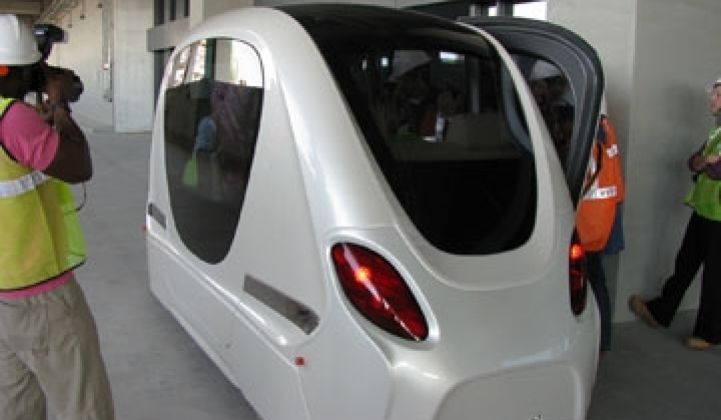Masdar City, Abu Dhabi -- Some electric cars are meant to win races.
Others are made to carry groceries.
The Masdar Initiative, the wide-ranging alternative energy project funded by the government of Abu Dhabi, is testing out autonomous electric vehicles as part of the research park/residential complex development called Masdar City to see if communities and people will adapt to a relatively new form of public transportation.
The cars-created by a Dutch company called To Get There-will effectively serve to shuttle people and packages around the six square kilometer development. Because it's supposed to be a net zero energy community, Masdar City will not have regular gas-burning cars. Instead, people will live and work in mixed use developments and mostly walk. But on hot days, or when you have a lot to carry, the cars will come in handy.
Masdar has already ordered thirteen cars-two VIP models, eight regular ones and two designed to ferry cargo-and has just begun to test them, according to Masara Alamri, the master plan department manager for Masdar. (see video) . The cars can go as fast as 40 kilometers an hour (25 miles per hour), but during the test the speed is kept to five meters per second, she added. They run on batteries and get charged at night through other battery packs, which are charged by solar panels in the daytime. A car can go about 60 kilometers on a charge.
During the test, the cars are only traveling between two fixed stations. But if all goes well, residents will be able to order a car at one building and then get driven to any other building. The cars are not on tracks and are not driven by people. Instead, RFID sensors in overhead and magnetic sensors embedded in the roadway will guide the car. Sensors in the front of the car detect pedestrians and stop automatically if someone is in the roadway.
Which actually can be a problem. People are somewhat intrigued by the cars and stand to gape at them. But as long as they are standing in front of the car, it won't move, said the project manager for To Get There.
Cost? It wasn't revealed, but in a country flooded in petrodollars and on a construction rampage, it's not the most relevant question.



